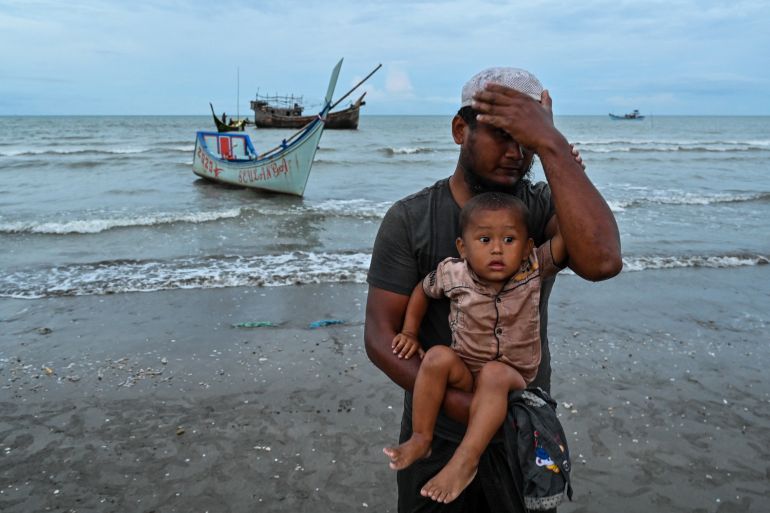‘Many more could die’: Urgent plea for Rohingya refugees trapped at sea
At least one passenger on a boat carrying 185 refugees has died, with dozens more in ‘critical condition’, warns UNHCR.

Fears are growing for scores of Rohingya refugees believed to be stranded at sea in the Indian Ocean, after a boat they set off in from Bangladesh saw its engine fail.
The group of some 185 Rohingya, mostly women and children, are in desperate need of rescue after falling into distress near the Andaman and Nicobar Islands, the United Nations High Commissioner for Refugees (UNHCR) said on Saturday.
Keep reading
list of 4 itemsMyanmar seeking to repatriate Rohingya refugees from Bangladesh
Indonesia faces new refugee crisis as Rohingya boat pushed back to sea
Tensions rise as two more boats with over 300 Rohingya land in Indonesia
The Rohingya were fleeing overcrowded refugee camps in Bangladesh, where they had taken shelter after escaping their homeland in Myanmar. More than 750,000 Rohingya were forced to flee Myanmar in 2017 after the military launched a crackdown on the Muslim minority, torching their homes and properties. The United States accused the military of committing genocide against the Rohingya people, while a genocide case against Myanmar is under way at the UN’s top court.
The UN agency said at least one of the boat’s passengers had already died, with a dozen more in “critical condition”.
“Many more could die under the watch of numerous coastal states without timely rescue and disembarkation to the nearest place of safety,” the UNHCR warned. “It is really a desperate situation.”
Thousands of the mostly Muslim Rohingya, heavily persecuted in Myanmar, undertake risky sea journeys from their country and refugee camps in Bangladesh every year trying to reach Malaysia or Indonesia.
More than 2,000 Rohingya are believed to have attempted the risky journey to Southeast Asian countries in 2022, according to UNHCR.
Since last year, more than 570 people, including Rohingya refugees, have been reported dead or missing at sea in the region, it said.
When it comes to the people currently adrift, the agency emphasised that “a bigger tragedy is preventable with timely efforts to save lives”.
“This situation once again underlines the importance of all states in the region deploying their full search and rescue capacities to avoid human disasters happening at this scale.”